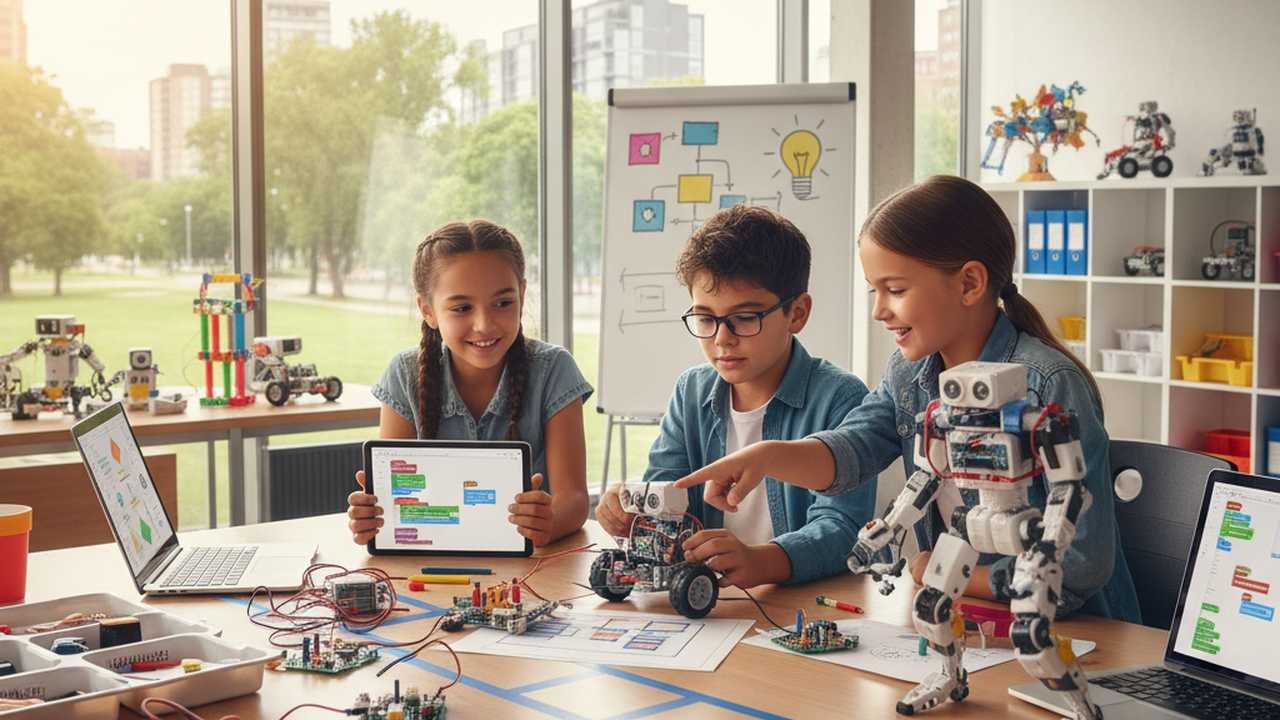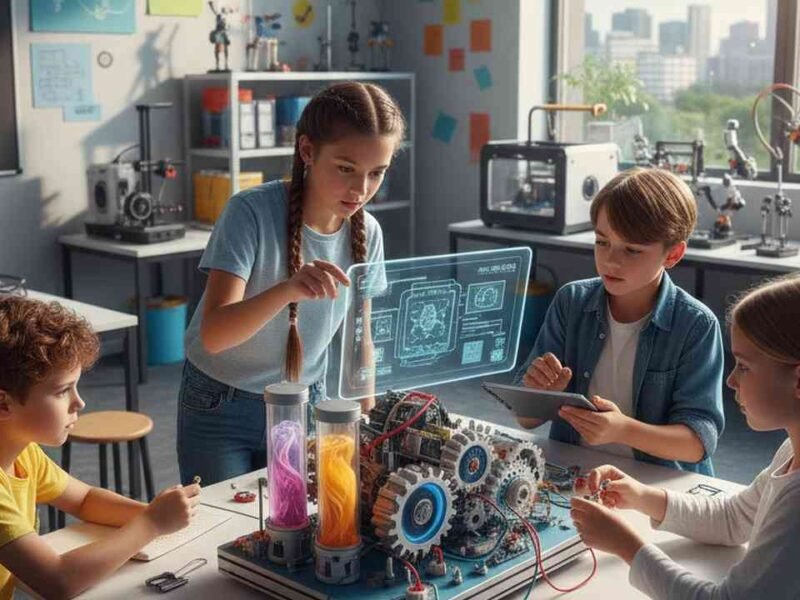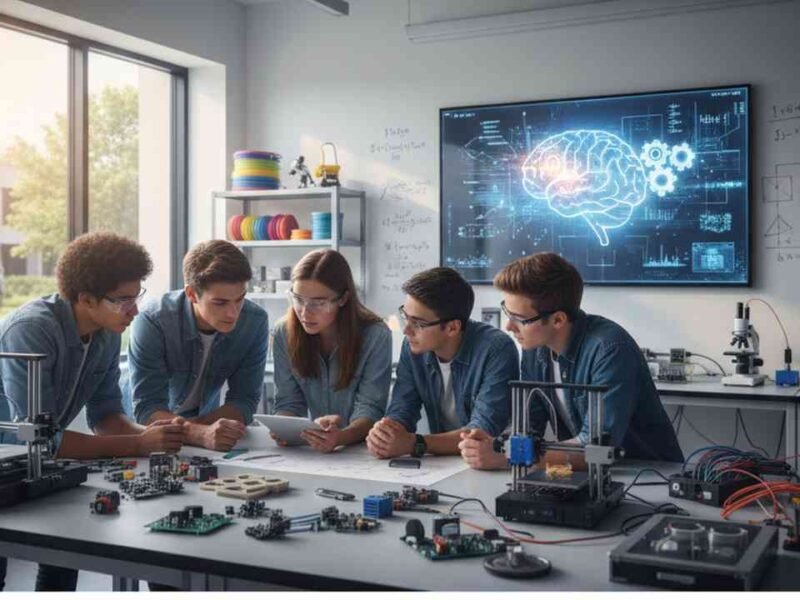In the fast-evolving world of education, traditional methods are being rapidly outpaced by innovative approaches that ignite curiosity, enhance problem-solving skills, and prepare students for the challenges of tomorrow. One such transformative approach is the integration of robotics and coding projects into educational curricula. These hands-on experiences not only captivate young minds but also cultivate essential skills that are crucial in our technology-driven society. This article delves into how robotics and coding projects are revolutionizing education, with a particular focus on the Jordan education system, and why embracing these tools is no longer optional but imperative.
The Rise of Robotics and Coding in Education
Gone are the days when education was confined to textbooks and rote memorization. Today, classrooms are dynamic environments where students actively engage with technology to solve real-world problems. Robotics and coding have emerged as central pillars in this educational transformation. By constructing robots and writing code, students learn to think critically, collaborate effectively, and approach challenges with a problem-solving mindset. These activities bridge the gap between theoretical knowledge and practical application, making learning more relevant and exciting.
In Jordan, the education system has recognized the importance of integrating technology into learning. Initiatives like Eureka Tech Academy in Amman offer specialized courses in robotics and coding, providing students with the tools to innovate and create. These programs are designed to nurture the next generation of engineers, programmers, and thinkers who will drive technological advancement in the region and beyond.
Enhancing Creativity Through Hands-On Learning
Robotics and coding projects are not just about building machines or writing lines of code; they are about unleashing creativity. When students are tasked with designing a robot or developing a software application, they are encouraged to think outside the box, experiment with ideas, and iterate on their designs. This process fosters a mindset of innovation and resilience, as students learn that failure is not a setback but a stepping stone to success.
In Jordan, educational institutions are embracing this creative approach. The International Robotics Academy, for instance, offers STEAM-based modules that integrate science, technology, engineering, arts, and mathematics. These interdisciplinary programs allow students to explore various facets of technology and apply their learning in creative ways. Such initiatives are crucial in a world where creativity is as valuable as technical expertise.
Developing Logical Thinking and Problem-Solving Skills
At the heart of robotics and coding lies the development of logical thinking and problem-solving abilities. Programming requires students to break down complex problems into manageable parts, identify patterns, and devise algorithms to achieve desired outcomes. Similarly, building and troubleshooting robots demand analytical thinking and persistence.
Studies have shown that students engaged in robotics education demonstrate improved academic performance and enhanced creative thinking skills. For example, a study conducted in Jordan found that eighth-grade students who participated in a STEAM-based robotics program exhibited significant gains in both academic achievement and creative thinking compared to their peers who received traditional instruction. This underscores the effectiveness of integrating robotics into education as a means to develop critical cognitive skills.
Fostering Collaboration and Teamwork
Modern challenges often require collaborative efforts, and robotics and coding projects provide an excellent platform for students to develop teamwork skills. Working in groups to design and build robots or develop software applications teaches students the value of communication, delegation, and collective problem-solving. These experiences mirror real-world scenarios where collaboration is key to success.
In Jordan, institutions like Jitawi Center offer courses in robotics and artificial intelligence that emphasize collaborative learning. By participating in group projects, students not only enhance their technical skills but also learn to navigate interpersonal dynamics, preparing them for future professional environments where teamwork is essential.
Preparing Students for Future Careers
The integration of robotics and coding into education is not merely about enhancing current learning experiences; it is about preparing students for future careers in a rapidly evolving job market. Fields such as artificial intelligence, data science, and robotics are among the fastest-growing industries globally. By equipping students with skills in these areas, educational institutions are ensuring that they remain competitive and capable of thriving in the workforce.
In Jordan, the establishment of programs like the Robotics and Artificial Intelligence Engineering bachelor’s degree at Amman University reflects a commitment to aligning education with industry needs. These programs provide students with the knowledge and skills necessary to pursue careers in cutting-edge technological fields, contributing to the country’s economic development and innovation landscape.
Integrating Robotics into the Jordan Education System
The Jordan education system has made significant strides in incorporating technology into its curricula. Initiatives by the Ministry of Education and various educational institutions aim to integrate robotics and coding into classrooms across the country. These efforts are designed to provide students with the skills needed to succeed in a digital world and to foster a culture of innovation within the educational system.
Programs offered by institutions like Eureka Tech Academy and the International Robotics Academy are instrumental in this integration. By offering specialized courses and workshops, these institutions provide students with opportunities to engage with robotics and coding in meaningful ways. Such programs are essential in ensuring that the next generation of Jordanians is equipped to meet the challenges and opportunities of the future.
Overcoming Challenges in Implementation
While the benefits of integrating robotics and coding into education are clear, the implementation of such programs comes with its challenges. These include the need for trained educators, access to resources and technology, and the adaptation of curricula to incorporate new teaching methods.
In Jordan, efforts are being made to address these challenges. Training programs for educators are being developed to equip them with the necessary skills to teach robotics and coding. Additionally, partnerships with technology providers are helping to ensure that schools have access to the tools and resources needed to implement these programs effectively. Overcoming these challenges is crucial to the successful integration of robotics into the education system and to realizing its full potential in enhancing learning outcomes.
The Global Impact of Robotics and Coding Education
The movement towards integrating robotics and coding into education is not confined to Jordan; it is a global trend. Countries around the world are recognizing the importance of these skills and are taking steps to incorporate them into their educational systems. This global shift underscores the universal value of robotics and coding education in preparing students for the future.
By participating in robotics and coding projects, students in Jordan are not only gaining skills that are in demand globally but are also contributing to a worldwide movement towards innovation and technological advancement. This global perspective enriches their learning experiences and broadens their horizons, preparing them to be active participants in a globalized world.
Conclusion: Embracing the Future of Education
The integration of robotics and coding into education represents a paradigm shift in how we approach teaching and learning. These projects foster creativity, enhance logical thinking, and prepare students for future careers in technology-driven industries. In Jordan, the education system’s efforts to incorporate these elements are commendable and essential for the country’s development.
For parents, educators, and policymakers, the message is clear: embracing robotics and coding education is not just an option; it is a necessity. By investing in these areas, we are investing in the future of our children and our society. It is time to act – before the opportunity slips away. Explore programs like those offered by Eureka Tech Academy and the International Robotics Academy, and take the first step towards a brighter, more innovative future.


